- Home
- Leslie Meier
Irish Parade Murder Page 4
Irish Parade Murder Read online
Page 4
“How do you feel about this, Lucy?” asked Rachel.
“Absolutely great,” said Lucy, unwilling to rain on Pam’s parade. “I mean, I don’t really know what I’m doing. I didn’t go to journalism school, so I’ve been operating on instinct. I’m sure this guy, Rob, can give me some valuable advice.”
“Or maybe you could give him some,” said Sue, tapping her mug with a Ballet Pink nail.
“This isn’t a put-down of you, Lucy,” said Pam, reaching across the table and taking her hand. “You do great work, and I made sure that this new guy isn’t making a lot more money than you. He’s full-time, of course, but I told Ted we are certainly not going to have wage inequality at our paper.”
“Well, thanks,” said Lucy, who wasn’t sure she believed Pam. For all she knew, and actually suspected, Rob was probably getting a handsome stipend from the TRUTH Project in addition to whatever pittance Ted was paying him. “That’s good to know.”
“What’s right is right,” insisted Pam. “And I know Ted is very eager to begin covering the county, which we all know has been pretty much a closed book. Sam Wilson’s one of those go-along-to-get-along types; he just printed whatever the sheriff or the county commissioners wanted him to print in the Gabber. He never questioned anything, never looked under any rocks, probably for fear that if he did they would cut him off and stop sending press releases.”
“That sheriff, Murphy, is a powerful guy,” said Rachel, with a little nod. “A small-time megalomaniac, with some real control issues. He runs the county jail, he hires the corrections officers and the deputy sheriffs, who are like his own private little gang, and he even runs the St. Patrick’s Day parade. He’s the sort of person who can be very dangerous if he feels threatened. I’d be very careful before I upset his apple cart. What do you think, Lucy?”
“I’m not tackling the powers that be. I’m leaving that to the new guy and sticking to what I do best, which is human interest, stuff like that.” She paused, taking a sip of coffee. “Today, for example, I’m interviewing this girl who makes puppets. A puppeteer.”
“Rosie Capshaw!” exclaimed Sue. “She’s fabulous. She’s a poor relation, a cousin, who’s set up a workshop on the Van Vorst estate where she makes these amazing creations. She approached me about doing something at Little Prodigies, maybe a puppet show or even a workshop, but I haven’t had a chance to discuss it with Chris.” Sue was part owner of Little Prodigies Child Care Center, where she formerly taught but nowadays limited herself to an administrative role. “That should be a terrific story, Lucy.”
“Sorry about the delay,” apologized Norine, arriving with their orders. “Our usual cook, Sandra, is out sick, and the guy who’s filling in isn’t quite up to speed.”
“Typical male,” said Sue, with a shrug. “If you want it done right, get a girl. Right, ladies?”
The women all laughed as they dug into their breakfasts, but Lucy wasn’t all that amused. While they were frustrated by their husbands’, or sons’, occasional lapses and incompetence, she was faced with more than the usual male failure to turn off the lights or difficulty finding things that were right in front of their eyes. For the first time in her career, she had to deal with a male rival, and she wasn’t sure how she was going to deal with the challenges he presented. She could, as she’d said, stick to the female sphere and focus on human-interest stories, but she suspected she would want to do more. If Ted’s new, expanded paper was actually going to challenge the powerful and expose corruption in the county, she knew she wanted to be part of it, but she didn’t have a clue how to make that happen. In the past, she’d simply followed stories where they led, and sometimes she’d broken some major scoops that went national, but now she would have to compete with Rob whenever some tantalizing lead appeared. The thing she feared the most was discovering a potentially big story, only to have it snatched away from her and assigned to Rob. What would she do then? Would she fight, would she threaten to quit, or would she knuckle under and let him exercise his male prerogative?
She was still mulling over that problem as she drove along Shore Road on her way to the Van Vorst estate. The road ran atop a series of cliffs overlooking the Atlantic Ocean, which was gray and choppy on this February day. Flocks of seabirds bobbed on the water, black ducks and eiders, and she wondered at their ability to endure in the often-hostile environment without any shelter. They had special oils, downy feathers, and body fat to keep them warm, and she hoped that she, too, had special qualities that would enable her to succeed in this new work environment.
Driving along the stone wall that bounded the Van Vorst estate, she turned through the open gate and followed the drive past the stately mansion and on to the area where the stables and barns were located. The estate had once been largely self-supporting, with its own farm producing milk, eggs, vegetables, and even pork and poultry meat, but nowadays it was used as a country retreat by supermodel Juliette Duff, who had inherited the estate. A small residential staff maintained the mansion and property, with help from daily workers.
Lucy wasn’t sure which brick building contained the puppet workshop, but as soon as she stepped out of her car, she was greeted by her subject, Rosie Capshaw.
“Over here,” yelled Rosie, who had a mass of curly black hair tied back by a red bandanna and was wearing a paint-stained farmer’s bib overall atop a thick thermal sweatshirt. “You must be Lucy,” she exclaimed, grabbing Lucy’s hand and shaking it. “I love your work! I’m so honored that you’re interested in writing about me.”
“Golly,” replied Lucy, with an embarrassed smile. “People aren’t usually that excited about talking to me.” She pulled her phone out of her oversized Fish Ladder Restoration Fund tote bag and held it up. “How about letting me snap your photo before I get to the tough questions and you throw me out?”
“Not likely.” Rosie obliged with a smiling pose. “I’m a whore for publicity, and you know what they say, there’s no such thing as bad publicity.”
“Well, lead on, and tell me about your puppets. I guess you do shows for kids, stuff like that,” began Lucy, thinking of the kiddie shows featuring fairy tales and superheroes she’d attended at the library with her youngsters.
“Sort of,” said Rosie, sliding the barn door open and revealing the interior, which was populated with huge, oversized constructions that bore no similarity to the hand puppets and marionettes Lucy had expected. A number of the creations were lined up along a wall, and several work benches contained parts of others that were still being built. The barn smelled of paint, sawdust, and glue, reminding Lucy of her grandfather’s basement wood workshop.
“This is not what I expected,” admitted Lucy, looking around in awe.
“I know. You say you build puppets and people think of Mr. Rogers and Daniel Tiger.” Rosie shrugged. “It all started when I saw the show War Horse on Broadway. The horse was a life-size puppet operated by several actors, and I was enthralled. They were able to convey so much emotion, it was so lifelike, that I was blown away. I knew it was something I wanted to do, and believe me, I was a girl without a clue. But when I saw that horse, everything fell into place for me. I got myself hired as a stagehand . . .”
“For War Horse? On Broadway?” Lucy was amazed.
“Yeah.” Rosie shrugged. “I couldn’t believe it myself. I just walked in one day and asked for a job, and next thing I knew, I was painting and gluing and patching up that puppet horse, keeping it in shape for the show.”
“And that led to all this?” suggested Lucy, waving a hand at the huge creations populating the barn.
“Yeah, that was the beginning. Want a tour?” Rosie led the way, pointing as she went. “Okay,” she began, standing in front of a figure covered with fake leaves, “this is a Green Man; he was part of a farm festival in Vermont. And here I’ve got Mother Jones,” she said, moving to the next figure, which was a woman dressed in a long skirt and shawl. “She was involved in the early days of the labor movement, and I made
her for a Me Too event. These guys, these ghosts and ghouls, they were for a Halloween haunted house.”
“So you provide these figures for who? Organizations? Private parties? Stage?”
“All of the above,” said Rosie. “Want to see what I’m working on now?”
“Sure,” said Lucy, leaving the huge ghoulish figures and following her to a nearby workbench.
“This is going to be St. Patrick,” said Rosie, lifting up a large, bearded head she was constructing out of a big fishing buoy. “I like to recycle, use found objects where I can. He’s going to be great when he’s finished. I figure I can use him, along with Mother Jones, and I can rework one of the ghouls into a banshee . . .”
“Is this for a special event? A party?” asked Lucy.
“Oh, no. It’s for the St. Patrick’s Day parade.”
“In Boston?” asked Lucy.
“No. The one right here, in Gilead.”
“They’ve asked you to participate?” inquired Lucy, who knew the parade featured bands, step-dancers, floats from community organizations, and lots of marching firemen and policemen. She was rather doubtful that the notoriously conservative Hibernian Knights, who organized the parade, would welcome Rosie’s oversized puppets.
“Oh, no, but I figured this would be a great opportunity to showcase my work. I don’t expect them to pay me or anything.”
“You’d better sit down,” said Lucy, indicating a couple of stools by the workbench. When they were both seated, she broke the news. “The parade is run by this club, the Hibernian Knights; they’re all of Irish descent, and they have a strict vetting process. Anyone who wants to march has to apply for permission, and last year they refused to let the Gay Vets march in the parade. They’re very conservative, and they don’t welcome newcomers.”
“I didn’t realize I had to apply,” said Rosie, missing Lucy’s point. “How do I get in touch with these Hibernian Knights?”
“They have a website,” said Lucy, “but it’s probably not worth the bother. I don’t see them going for your giant puppets.”
“Don’t be so negative,” said Rosie. “They’re going to love my St. Patrick and his snakes.”
Sure, thought Lucy, and pigs can fly. “Let me get some photos of the gang,” said Lucy, with a nod toward Rosie’s creations. “They are amazing.”
“Yeah.” Rosie smiled fondly at the Green Man. “Isn’t he gorgeous? And he’s green. He could be in the St. Pat’s parade, too. I don’t know why I didn’t think of it. And Mother Jones was Irish. This is going to be the best parade ever! You’ll see.”
Chapter Four
Lucy was driving back to the office to make Ted’s budget meeting when her cell phone rang; since she was on Shore Road, where a moment’s inattention could send you over the cliff into the ocean, she pulled into the driveway of a vacant summer home. Most of the big houses overlooking the water were empty this time of year, while their owners were making big bucks in New York or Boston. The call was coming from Town Hall, she realized; she recognized the number with a sinking feeling, figuring she’d gotten something wrong in that stupid zoning story.
Her suspicion was correct. The caller was Nancy Braithwaite, the town planner. “I was surprised when I read the article, Lucy,” she began, “since you so rarely get anything wrong. But I thought I made it clear that the proposed changes would allow for more mixed-use development in town, and would also encourage in-law apartments, which have previously not been allowed.”
“That’s what I wrote,” responded Lucy, puzzled.
“Well, it’s not what the story says. Do you want me to read it to you?”
“No, I’m on way to the office anyway, and I’ll take a look. I think I know what happened,” she said, convinced that Rob had made erroneous changes when he edited her story. “I’ll make sure we print a correction.”
“The vote is coming up in a few weeks, and it’s important that people have the right information,” said Nancy, sounding worried. “The planning committee and I have been working on this for over a year. I’d hate to see all our hard work go for naught.”
“I’m really sorry this happened. We’ve got a new guy, and he’s not quite up to speed.”
“I didn’t think it was your mistake, Lucy.” Nancy paused. “To tell the truth, the writing wasn’t very good; it wasn’t your style.” She lowered her voice. “There were misplaced apostrophes.”
“Thanks for calling, Nancy, and I’ll make sure that correction is right on page one.”
Ending the call, Lucy sat in the car and focused on the horizon, where gray water met gray sky. Her emotions were out of control; she was furious with Rob, and she wanted to scream at him and let him know exactly what she thought of his editing. Not just his editing, his presumed superiority. So Super-Journalist Rob was going to help them, was going to show them how to improve the paper. Good work, so far, Rob. Misplaced apostrophes!
Let it out, now, she told herself, letting loose with a scream that sent a flock of blackbirds perched on the electric line scattering into the sky. Let it all out, because she was going to have to be ever so professional, and rational, and reasonable when she got to the office. Confrontation would get her nowhere, but she had to find a way to make sure that Ted, and her readers, knew that she was a reliable and trustworthy reporter, with a solid grasp of correct grammar. Shifting into drive, she pulled onto Shore Road and continued to the office, pondering her dilemma.
It wasn’t quite noon when she arrived, and neither Ted nor Rob were in the office. Phyllis was at her desk, where her computer screen was decorated with red heart stickers, and greeted Lucy with a big smile. “Guess what?” she demanded, by way of greeting.
“Guess what yourself,” replied Lucy, somewhat confused.
“You’ll never guess.” Phyllis was smiling, bursting with some unexpected news.
“You’re pregnant?” guessed Lucy, thinking this was one for the Guinness Book of Records.
“No. I’m part Native American.” She nodded. “I really am. Five percent.”
“I’m guessing you did one of those cheek-swab DNA kits,” said Lucy.
“I did, and so did Wilf. No surprises there, really, except that he’s not one hundred percent Swedish, like he thought; there is some Czech mixed in. And I guess I shouldn’t be so surprised about being partly Native American since my ancestors have been here for centuries, and there probably weren’t too many possible mates available for those early settlers.”
“It could’ve been rape, you know,” said Lucy, plucking one of the new Pennysaver issues from the stack on the reception counter. “A lot of bad stuff happened back then between the natives and the settlers. It wasn’t always love.”
“Lucy! Shame on you! My ancestors were undoubtedly good, upstanding folk; they’d never do anything like that!”
“Just saying, if you read your history books . . .”
“I think it was like John Smith and Pocahontas, begging her chieftain father to spare his life; that’s history for you.”
“Probably a tall tale,” laughed Lucy. “As it happens, Bill just heard from some woman who did a DNA test and claims she’s his half sister. It’s kind of thrown him for a loop, coming so soon after his father’s death.”
“Half sister? Out of nowhere?”
“Yeah.” Lucy had hung her jacket on the coatrack and had seated herself at her desk, where she powered up her computer and waited for it to complete the laborious business of waking up, complete with groans and grinds. “If it’s true, it means his father must’ve had an affair, or maybe a previous marriage. Bill’s not at all sure his mother is ready for this.”
“I think you’d better be very careful. I’ve read there are a lot of DNA cons going on. People claiming to be related, especially after a death, in hopes of cashing in on some sort of inheritance. Like if a will says “to my issue,” instead of naming each heir, they could make a claim on the estate.”
“Come to think of it, I don’t know anyt
hing about a will, if there even is one,” said Lucy, glancing at the Pennysaver, which featured her zoning story on the front page.
“Then you could be in big trouble because the state’s inheritance laws will take over,” continued Phyllis. “I don’t what they are in Florida, but a lot of times, they divide the estate among the spouse and the kids, even though most couples leave everything to the surviving spouse. That’s what Wilf and I did, but of course we don’t have kids.”
“Not that you know about,” said Lucy, turning her attention to the story, which she read quickly, growing angrier with each mangled sentence. She’d just finished reading when the bell on the door announced Ted’s arrival, accompanied by Rob.
Lucy thought the two men seemed to be sharing some sort of joke, chuckling and nodding along with each other, just short of slapping each other on the back or punching each other’s arms as they removed their jackets and hung them up. She realized she was going to have to deal delicately with the matter of the correction, so she decided to avoid confrontation and take the matter into her own hands by writing it herself. “Due to an editing error,” she began, quickly completing the text and sending it to Ted.
Ted was busy fixing himself a cup of coffee and inquiring if anybody else wanted one before they went into the morgue for the budget meeting. Rob wanted one, cream and two sugars, and Ted fixed it for him; then they all gathered around the table in the room that served as both conference room and library.
“Wow,” enthused Rob, gazing at the huge bound volumes of previous issues dating back to the early 1800s. “I bet there’s some history here.”
“Sure is,” said Ted, beaming at his protégé. “Shay’s Rebellion, the Civil War, Lincoln’s assassination, world wars, it’s all here.” He sat down, took a sip of coffee, and rubbed his hands together. “Okay, let’s get to work. Lucy, how’s your feature looking?”

 Christmas Card Murder
Christmas Card Murder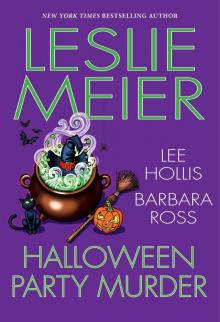 Halloween Party Murder
Halloween Party Murder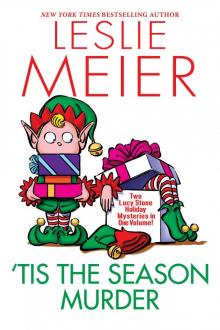 'Tis the Season Murder
'Tis the Season Murder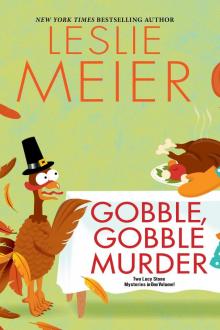 Gobble, Gobble Murder
Gobble, Gobble Murder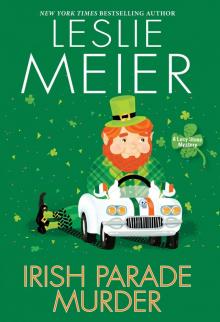 Irish Parade Murder
Irish Parade Murder Bake Sale Murder
Bake Sale Murder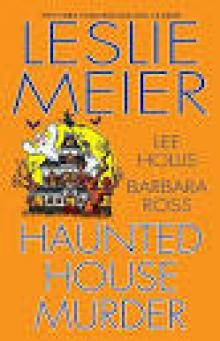 Haunted House Murder
Haunted House Murder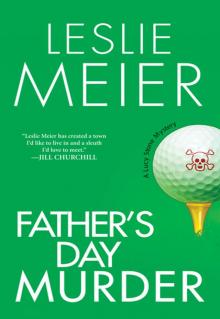 Father’s Day Murder
Father’s Day Murder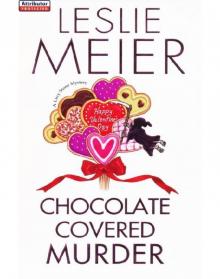 Chocolate Covered Murder
Chocolate Covered Murder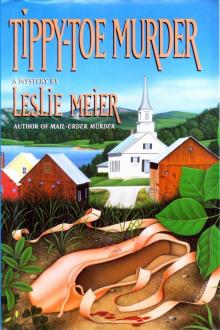 Tippy Toe Murder
Tippy Toe Murder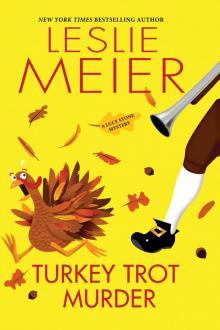 Turkey Trot Murder
Turkey Trot Murder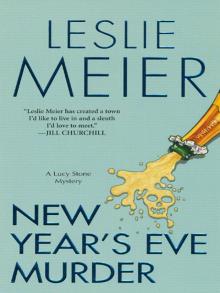 New Year's Eve Murder
New Year's Eve Murder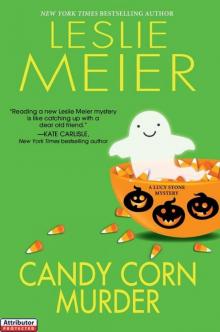 Candy Corn Murder
Candy Corn Murder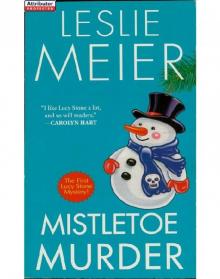 Mistletoe Murder
Mistletoe Murder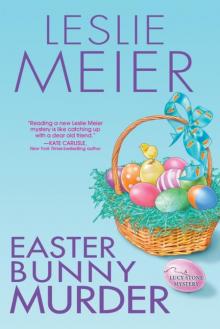 LStone 20 - Easter Bunny Murder
LStone 20 - Easter Bunny Murder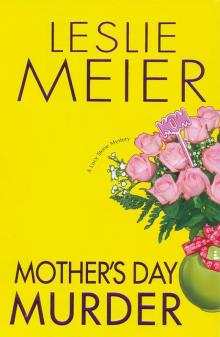 Mother's Day Murder
Mother's Day Murder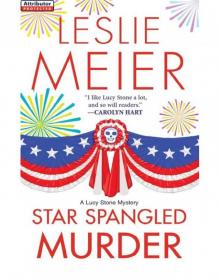 Star Spangled Murder
Star Spangled Murder Silver Anniversary Murder
Silver Anniversary Murder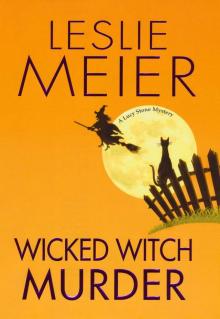 Wicked Witch Murder
Wicked Witch Murder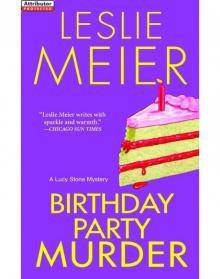 Birthday Party Murder
Birthday Party Murder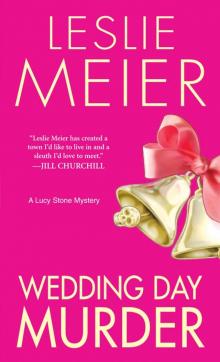 Wedding Day Murder
Wedding Day Murder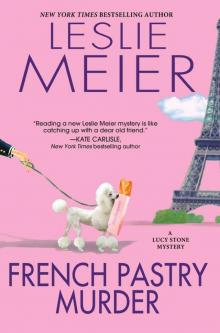 French Pastry Murder
French Pastry Murder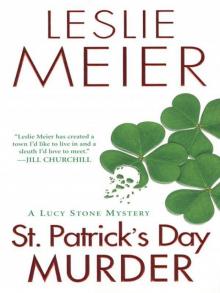 St. Patrick's Day Murder
St. Patrick's Day Murder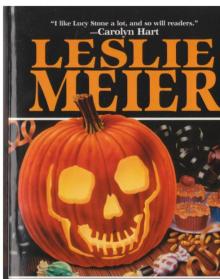 Trick or Treat Murder
Trick or Treat Murder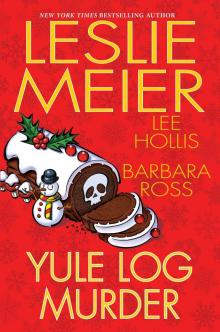 Yule Log Murder
Yule Log Murder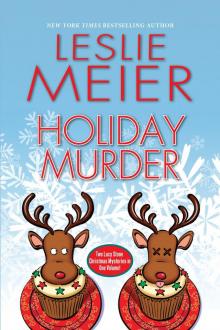 Holiday Murder
Holiday Murder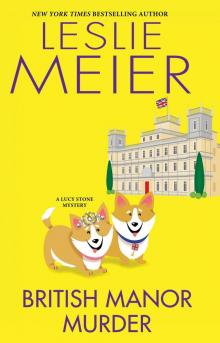 British Manor Murder
British Manor Murder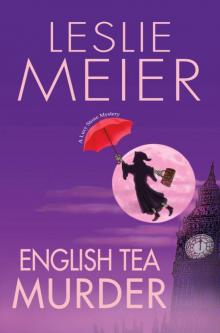 English Tea Murder
English Tea Murder